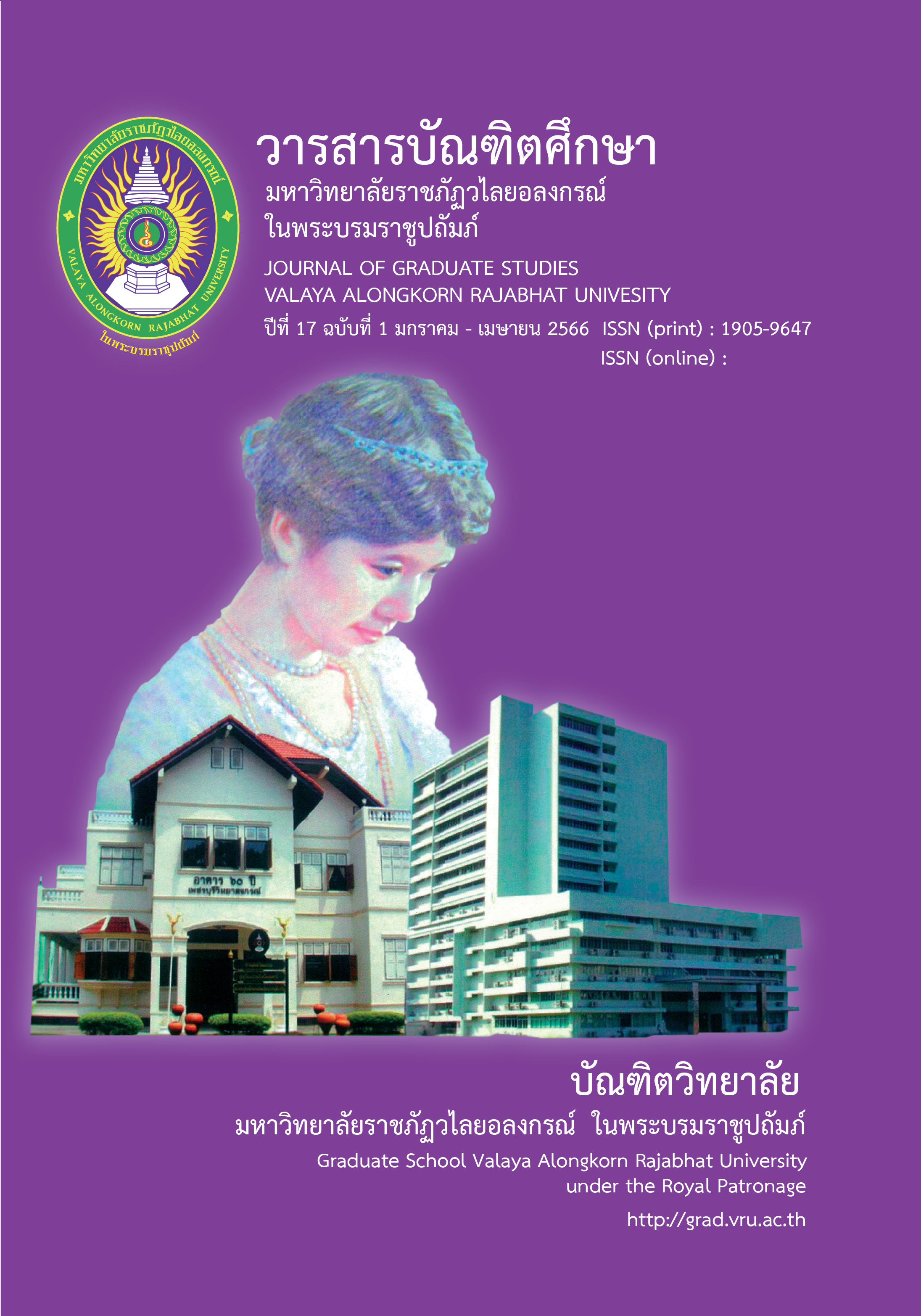EFFECTIVENESS OF INTERACTIVE E-LEARNING ENVIRONMENT MODEL BY USING ACTIVE LEARNING TO ENHANCE HIGHER ORDER THINKING SKILLS IN DISTANCE LEARNING SYSTEM
Main Article Content
Abstract
The objectives of this study were to 1) Compare the pretest scores and posttest scores’ s self-perception on higher order thinking skills of graduate students in distance learning system, 2) study the higher order thinking skills assessment by creating group work’s one page research design of graduate students in distance learning system, and 3) study the reflection of graduate students in distance learning system after studying with the interactive e-Learning environment model by using active learning. The sample group for the experiment is the 36 graduate students from Sukhothai Thammathirat Open University. They are the volunteers who were registered in the first semester of the academic year 2021 and want to develop higher order thinking skills. The research tools consist of the assessment form on the self-perception on higher order thinking skills and the higher order thinking assessment form. Data analysis was done by percentages, means, standard deviation and t-test analysis.
The research found that: 1) The pretest scores of the sample group’s self-perception on higher order thinking skills was higher than the posttest scores of the sample group’s self-perception on higher order thinking skills with statistical significance at the level of 0.05. 2) The overall higher order thinking skills assessment of the sample group was at the highest level ( = 17.88). and 3) the results also showed that the sample group was satisfied to study with the interactive e-Learning environment model by using active learning because they have practiced the process of thinking in a step-by-step manner and systematically.
Article Details

This work is licensed under a Creative Commons Attribution-NonCommercial-NoDerivatives 4.0 International License.
บทความทุกเรื่องได้รับการตรวจความถูกต้องทางวิชาการโดยผู้ทรงคุณวุฒิ ทรรศนะและข้อคิดเห็นในบทความ Journal of Global of Perspectives in Humanities and Social Sciences (J-GPHSS) มิใช่เป็นทรรศนะและความคิดของผู้จัดทำจึงมิใช่ความรับผิดชอบของบัณฑิตวิทยาลัย มหาวิทยาลัยราชภัฏวไลยอลงกรณ์ ในพระบรมราชูปถัมภ์ กองบรรณาธิการไม่สงวนสิทธิ์การคัดลอก แต่ให้อ้างอิงแหล่งที่มา
References
Asok, D., Abirami, A., Angeline, N. & Lavanya, R. (2016). Active learning environment for achieving higher-order thinking skills in engineering education. IEEE 4th International Conference on MOOCs, Innovation and Technology in Education (MITE), 2016, pp. 47-53, doi: 10.1109/MITE.2016.020.
Chotipuntu, P. (2013). kānsō̜n phư̄a phatthanā thaksa kān khit khan sūng [Teaching to develop higher order thinking skills]. PBL booklet Walailak. 6(1), 8-9.
Churches, A. (2009). Bloom's digital taxonomy. Retrieved from https://www.academia.edu/30868755/Andrew_Churches_Blooms_Digital_Taxonomy.pdf.
Dachakupt, P. & Yindeesuk, P. (2018). kānrīanrū chœ̄ng ruk bǣp rūamphalang kap PLC phư̄a kānphatthanā [Collaborative active learning with plc for development]. Bangkok: Chulalongkorn University Printing House.
Freeman, S., et al. (2014). Active learning increases student performance in science, engineering, and mathematics. Proc Natl Acad Sci USA. 111(23), 8410–8415.
Malanog, S. & Aliazas, J. (2021). Active learning strategies and higher -order thinking skills of grade 10 students. IOER International Multidisciplinary Research Journal. 3(3), 241-249.
Mueannadon, R., et al. (2019). kānphatthanā kānrīanrū phān kān sathō̜n khit [Learning development through reflection]. Journal of Health and Nursing Research. 35(2), 13-25.
Phuviphadawat. (2001). kān yưt phū rīan pen sūnklāng læ kānpramœ̄n tām saphāp čhing [Learner-centered and authentic assessment]. Third Edition, Chiang Mai: The Knowledge Center.
Romadhoni, I. & Nurlaela, L. (2018). Higher order thinking skills to enhance millennial students through active learning strategies. 10.2991/aptekindo-18.2018.20.
Sungkawadee, R. & Kaewurai, R. (2017). kānphatthanā botrīan ning rūam kap kitčhakam phān fētbuk nai rāiwichā withī chīwit nai yuk dičhithan rư̄ang čhariyatham thāng withī chīwit nai yuk dičhithan khō̜ng nisit parinyā trī mahāwitthayālai Narēsūan [The development of e – learning courseware integrated with activities on Facebook in the ways of living in the digital age course: the ethics of living in the digital era of living for bachelor degree students, Naresuan University]. Journal of Education Naresuan University. 19(3), 133–146.
Thanopetch, A. & Weerapan, D. (2021). phalok ra čhat kitčhakam kānrīanrū chœ̄ng ruk dōi chai khrōngkān pen thānot hō̜ng rīan khanāt yai rāiwichā khwāmpen sākon phư̄a kāndō̜ nœ̄n chīwit nai prachākhom ʻĀsīan læ prachākhom lōk [The effects of active learning using project-based for large classroom in internationalization for living in the ASEAN and global communities course]. Journal of Graduate Studies Valaya Alongkorn Rajabhat University. 15(1), 204-217.


